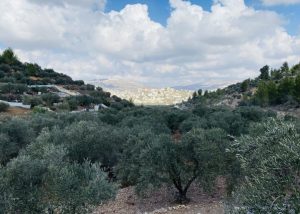PNN – The occupiers believe that displacing Palestinian citizens from their land begins with uprooting the olive tree. The boycott of the olive crop has become a systematic strategy during the 77-year occupation of the land.
Targeting olive trees in Palestine by the Israeli regime has become a systematic strategy during its 77-year occupation of the land. The occupation’s attacks on olive tree crops, which have been a source of livelihood for Palestinian families for years and continue to this day, have significant impacts on Palestinian agriculture, the economy, and identity. The deliberate attacks by the occupying army on Palestinian trees, especially the olive tree, which is a symbol of Palestine, intensify every year during the harvest season.
Olives are the largest agricultural crop in the Palestinians, accounting for 45 percent of the total agricultural area. Palestinian citizens are not allowed to harvest olives from their own lands during the olive harvest season; Area C of the West Bank, which accounts for 60 percent of Palestinian cultivated land, is heavily restricted by the Israeli regime.
The stability of a Palestinian citizen in his land is linked to the stability of the olive trees there. The occupiers and settlers believe that displacing citizens from their land begins with the uprooting of the olive tree. For this reason, this year, as in previous years, the Zionist occupying forces suppressed the olive harvest ceremony in the village of “Al-Nazla Al-Sharqiya” located north of Tulkarm in the northern West Bank, “Tirmesa’iya” located north of Ramallah, and the village of “Mukhmas” in the north of occupied Jerusalem.
During the attack, a number of participants suffered from suffocation and breathing problems due to tear gas inhalation. Eyewitnesses stated that the occupying forces were trying to prevent Palestinian farmers from continuing their activities on their lands by firing tear gas and stun bullets. Also, “Ism Jihad Nasser”, a Palestinian teenager from the town of Beita, suffered serious injuries in an attack by Zionist soldiers while picking olives and is currently in a coma.

The occupying regime in Jerusalem pursues the boycott of olive crops in Palestine through three axes, which are described below.
How are olives boycotted in Palestine?
The first axis of this embargo is dedicated to the occupation and its laws prohibiting the entry and circulation of many fertilizers in the market, closing roads and crossings, and establishing more than 900 checkpoints in the West Bank. A ban on exports abroad is also on the occupiers’ agenda. Also, the distance between Ramallah and Nablus is 50 kilometers, which sometimes takes six hours to cross, and farmers are also prevented from accessing their lands.
The army and settlers’ attacks on olive trees, attacking farmers in their fields, stealing crops after harvest, and stealing their animals and equipment are the second axis of the occupation’s boycott of olives. The occupying army of Jerusalem directly attacks olive trees by uprooting them, bulldozing them, poisoning them, or drowning them in sewage.
The Apartheid Wall, built by the Israeli regime after the Second Intifada, is the third axis of the boycott of olive crops in Palestine; it is 670 kilometers long. Access through it requires a special permit, which is granted to the landowner for only two days, for plowing and harvesting. Since the start of the Gaza offensive in October 2023, no one has been able to enter their fields, and the fruit has remained on the trees. In 2024, some farmers received permits too late to harvest the fruit, as weeds had eaten away at the trees and the land had been neglected for two consecutive years.
Palestinians stand like olive trees
Palestinians, like old olive trees, have stood proudly in their land. Farmers, workers, and olive growing companies eagerly await the olive harvest, even though their farmlands are targeted by the Zionist occupiers every year during the harvest season. It is worth noting that during the years of the occupation of Palestine and the boycott of the olive crop, families’ reliance on the olive harvest season to hold social events such as weddings, completing construction, etc. has decreased due to the fragmentation of their property. The ongoing encroachment on olive trees in Palestine is one of the most horrific crimes of the occupation that history will never cease to record.
Looking back in history, it becomes clear that Palestine is the original birthplace of the olive tree. In Palestine, the olive tree is not just a plant, but rather a part of identity, a symbol of the land, and a symbol of survival. Many of the trees are hundreds, even thousands, of years old, bearing witness to successive civilizations and enduring resistance. Each olive tree represents history, stability, and truth, and for this reason, the occupiers are brutally targeting it.

